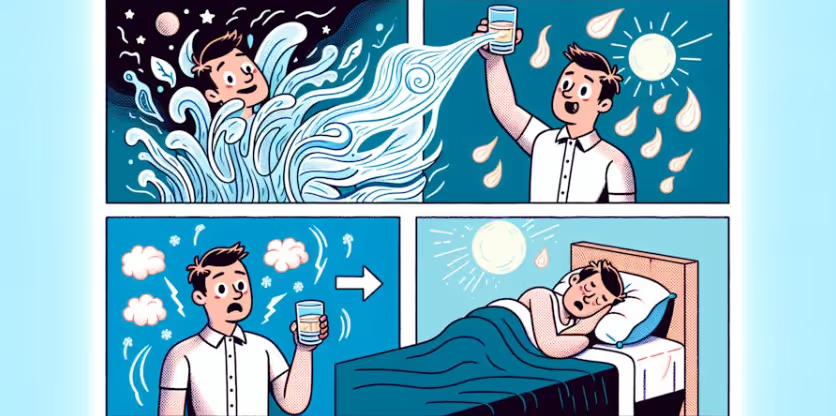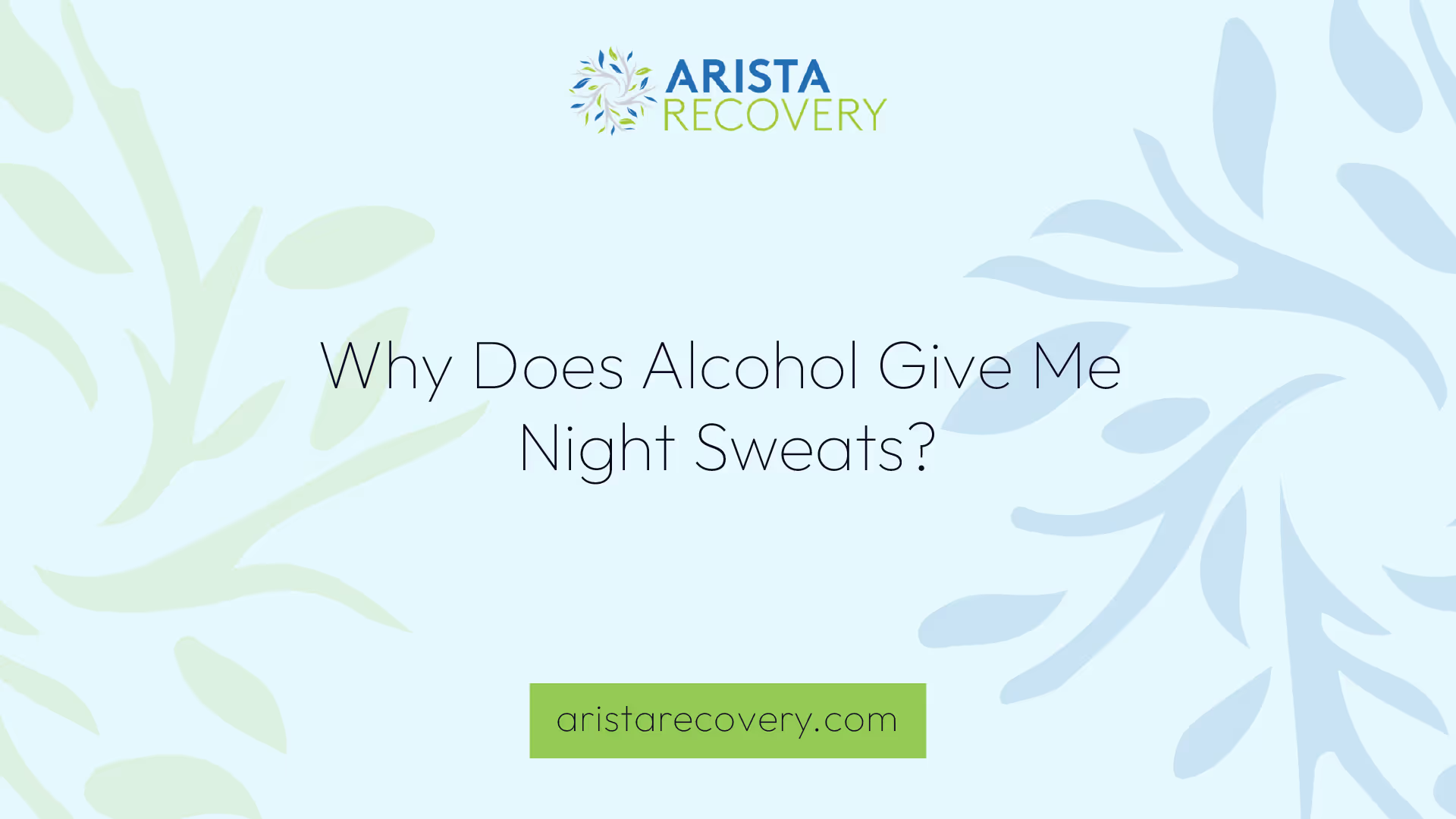
Why Does Alcohol Give Me Night Sweats?
Understanding Night Sweats from Alcohol
Night sweats, or excessive sweating during sleep, is a common issue experienced by many people. One of the factors that can trigger this condition is alcohol consumption. If you've ever wondered, "why does alcohol give me night sweats?", this section will provide some insights.

Impact of Alcohol on Body Temperature
Alcohol, despite its warming sensation when consumed, can actually lead to a decrease in body temperature. This is supported by a study where the deep body temperature in individuals who consumed 15% alcohol started to decrease and eventually fell 0.3 degrees Celsius lower than in controls who drank water. Skin blood flow and chest sweat rate also significantly increased after alcohol consumption compared to the control group.
This temperature decrease happens because alcohol is a vasodilator - it widens the blood vessels, especially those close to the skin. This makes more blood flow to the skin and away from the core of the body. While this can make a person feel warmer initially, it eventually leads to a drop in body temperature.
Vasodilation and Night Sweats
As explained above, the vasodilation effect of alcohol can cause a person to feel warmer. This sensation might cause the body to react as if it's overheating, triggering sweat production to cool down the body. This can result in night sweats, even if you've only had one drink.
It's also important to note that night sweats triggered by alcohol consumption aren't a means for the body to expel alcohol faster. Most of the alcohol consumed is broken down by the liver through metabolism, not through sweat.
In conclusion, while alcohol has many effects on the body, its impact on body temperature and the subsequent trigger of night sweats is significant. This understanding is crucial in managing alcohol-induced night sweats.
Factors Contributing to Alcohol-Induced Night Sweats
The question of 'why does alcohol give me night sweats?' can be answered by understanding the effects of alcohol consumption and withdrawal. These factors play a crucial role in triggering night sweats, making it critical to comprehend them for effective management and prevention.
Alcohol Consumption Effects
Alcohol consumption can cause night sweats, an occurrence that can happen if an individual has an alcohol use disorder, binge drinks, or even after just one drink Healthline. The impact of alcohol on the central nervous system, the circulatory system, and other parts of the body can lead to physiological changes including an increased heart rate and widened blood vessels in the skin. These changes can in turn induce perspiration, resulting in night sweats.
In some individuals, alcohol-induced night sweats may be due to alcohol intolerance, which is commonly caused by a genetic mutation that affects the body's ability to break down alcohol toxins. This intolerance can manifest in various symptoms, including night sweats Healthline.
Alcohol Withdrawal Symptoms
In addition to the effects of alcohol consumption, the symptoms of alcohol withdrawal can also lead to night sweats. Common withdrawal symptoms include sweating, clammy skin, and night sweats Healthline.
One severe form of alcohol withdrawal is known as delirium tremens (DT). This condition can cause symptoms like severe sweating, fever, hallucinations, and seizures. Delirium tremens is a life-threatening event that necessitates immediate medical attention Healthline.
Understanding these factors can provide insights into the causes of alcohol-induced night sweats and highlight the importance of managing alcohol consumption. If you're experiencing night sweats due to alcohol, consider seeking professional help to manage your symptoms and address the underlying causes.
Exploring Night Sweats: Causes and Triggers
When examining the causes and triggers of night sweats, especially in relation to alcohol consumption, it's essential to consider factors such as alcohol intolerance and hormonal shifts that can contribute to this uncomfortable condition.
Alcohol Intolerance and Night Sweats
One potential cause of alcohol-induced night sweats is a condition known as alcohol intolerance. This is a genetic mutation where the body lacks the necessary enzymes to effectively break down the toxins in alcohol. This inability to process alcohol properly can lead to a number of symptoms, including excessive sweating, particularly facial flushing and night sweats [3].
Night sweats due to alcohol intolerance can affect various parts of the body, including the face, chest, back, and arms. Individuals with alcohol intolerance may also experience other symptoms such as rapid heartbeat, stomach pain, and nausea.
If you suspect that alcohol intolerance is causing your night sweats, the recommended course of action is to limit or completely avoid alcohol consumption for relief [2].
Hormone Levels and Night Sweats
Fluctuations in hormone levels can also be a trigger for night sweats. This is particularly relevant in the context of alcohol consumption, as alcohol can disrupt the balance of hormones in the body.
For instance, alcohol can increase the level of stress hormones like cortisol, which can disrupt sleep and lead to night sweats. Additionally, alcohol can stimulate the production of sweat by affecting the nervous system and dilating the blood vessels, causing the body to heat up and sweat.
In some cases, night sweats may be a symptom of alcohol withdrawal. This symptom, along with most others of withdrawal, is temporary, but it is important to seek medical attention if you are experiencing withdrawal symptoms as they can sometimes be severe [2].
Understanding these triggers and causes can help individuals determine why alcohol gives them night sweats, and guide them towards potential solutions for this issue. The next section will provide insights on how to manage and address night sweats due to alcohol.
Managing Night Sweats Due to Alcohol
One of the common queries is 'why does alcohol give me night sweats?' Understanding the causes and knowing how to manage these symptoms can help individuals alleviate the discomfort associated with alcohol-induced night sweats.
Replenishing Fluids
Alcohol consumption can cause night sweats, leading to a significant loss of bodily fluids [2]. To counteract this, it is important to replenish the body's water supply. Drinking plenty of water can help maintain hydration levels and reduce the impact of alcohol's diuretic effect, which increases urine production and can lead to dehydration [5].
It's important to note that sweating or causing oneself to perspire will not speed up the expulsion of alcohol from the system, as the liver metabolizes most alcohol consumed.
Coping with Alcohol Withdrawal
Night sweats might also result from alcohol withdrawal or alcohol intolerance. Therefore, it's crucial to understand how to cope with these symptoms effectively. One of the key steps in managing alcohol withdrawal is seeking professional help. Medical professionals can provide a supervised detoxification process, helping individuals safely navigate the withdrawal symptoms.
There are also several self-care strategies that can be beneficial. For instance, establishing a regular sleep schedule and creating a comfortable sleep environment can help alleviate night sweats. It's also advisable to avoid alcohol close to bedtime, as it can disrupt the body's natural sleep cycle and exacerbate night sweats.
By implementing these strategies, individuals can significantly reduce the occurrence and severity of night sweats due to alcohol. Remember, while self-care strategies can be beneficial, professional medical advice should always be sought if alcohol withdrawal symptoms persist or worsen.
Recognizing Alcohol-Related Night Sweats
When answering the question, "why does alcohol give me night sweats?" it's important to recognize the signs and symptoms, and know when to seek medical attention.
Symptoms and Signs
Night sweats caused by alcohol can result from physical dependence on alcohol, leading to night sweats during sudden withdrawal. Furthermore, alcohol consumption can trigger night sweats, especially in individuals with an alcohol use disorder, those who binge drink, or even after consuming only one drink.
Night sweats can also be triggered by alcohol affecting the central nervous system, the circulatory system, and other parts of the body, leading to increased heart rate and widened blood vessels in the skin, which can induce perspiration. In some cases, alcohol-induced night sweats can be due to alcohol intolerance, a condition caused by a genetic mutation where the body cannot produce the enzymes to break down alcohol toxins [2].
Seeking Medical Attention
Alcohol withdrawal can cause night sweats, and this symptom, along with others, is temporary. Withdrawal symptoms can start hours after the last drink or take several days to appear and may last for weeks. However, severe forms of alcohol withdrawal, such as delirium tremens, require immediate medical care. Symptoms of delirium tremens include severe sweating, fever, hallucinations, and seizures.
If you experience any of these severe symptoms or if your night sweats persist despite limiting or stopping alcohol consumption, it's essential to seek medical attention. A healthcare professional can provide a proper diagnosis and guide you towards the most appropriate treatment. Remember, alcohol withdrawal can be dangerous and should be done under the supervision of a healthcare professional.
Addressing Night Sweats: Prevention and Solutions
Understanding why alcohol may cause night sweats and how to prevent these uncomfortable symptoms can greatly improve the quality of your sleep. Two crucial aspects to consider are the role of dehydration and the impact on sleep patterns.
Dehydration and Night Sweats
Alcohol, acting as a diuretic, increases urine production and can lead to dehydration. Dehydration, in turn, can trigger night sweats as the body regulates its temperature. This is particularly noticeable if alcohol is consumed close to bedtime.
To mitigate the risk of night sweats caused by dehydration, consider the following:
- Drink water before, during, and after alcohol consumption.
- Limit the amount of alcohol consumed, particularly close to bedtime.
- Consume hydrating foods or beverages along with alcohol.
These strategies can help maintain hydration levels and potentially lessen the occurrence of night sweats.
Disrupting Sleep Patterns
The effects of alcohol on the body extend beyond dehydration. Alcohol can disrupt the body's natural sleep cycle, leading to fragmented sleep patterns. While alcohol may help some individuals fall asleep faster, it can disrupt the normal sleep stages, making night sweats more noticeable. This disruption can also be accompanied by other symptoms like nightmares or vivid dreams [5].
Here are a few tips to help maintain regular sleep patterns:
- Avoid alcohol close to bedtime.
- Maintain a consistent sleep schedule.
- Create a sleep-friendly environment, including a cool and dark room.
Keeping a regular sleep cycle and minimizing disruptions can help manage alcohol-induced night sweats and improve overall sleep quality.
While these strategies can help, it's crucial to remember that regular, heavy drinking can lead to alcohol withdrawal, which can also cause night sweats. If night sweats continue despite these preventive measures, it's essential to seek medical attention. Other common causes of night sweats include hormonal fluctuations, infections, medications, and underlying medical conditions such as diabetes or certain cancers. These conditions require professional medical diagnosis and treatment.
References
[1]: https://pubmed.ncbi.nlm.nih.gov/16377461/
[2]: https://www.healthline.com/health/night-sweats-and-alcohol
[3]: https://www.medicalnewstoday.com/articles/324104
[4]: https://zinniahealth.com/substance-use/alcohol/night-sweats
[5]: https://www.leorabh.com/blog/why-does-alcohol-give-me-night-sweats
When mental health challenges and addiction intersect, it can feel isolating. At Arista, we offer compassionate, evidence-based, and trauma-informed care to help you heal, grow, and move forward.
You’re not alone in this.
When mental health challenges and addiction intersect, it can feel isolating. At Arista, we offer compassionate, evidence-based, and trauma-informed care to help you heal, grow, and move forward.
Support that moves with you.
You’ve taken a brave first step. At Arista Recovery, we’re here to help you continue with best-in-class care designed for long-term healing and support.
.webp)






